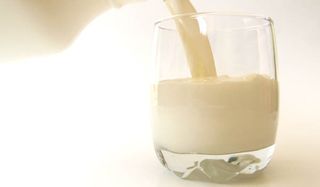Drinking Milk Not Linked to Early Puberty

Despite popular belief, drinking cow's milk does not increase children's risk for early puberty, according to a new study from China.
The study found no link between the amount of cow's milk children in Hong Kong drank between ages 6 months and 5 years, and the age at which they began puberty.
Whether or not the children were breastfed also did not affect the age puberty began, the researchers said.
"These findings suggest that breast-feeding or cow's milk consumption does not play a major role in pubertal timing," among children in non-Western countries, the researchers said.
The new study addresses some potential misconceptions held by the public, said Dr. Andrew Bremer, a pediatric endocrinology at Vanderbilt University School of Medicine, who was not involved in the study. "To my knowledge, there's no definitive evidence that exposure to milk causes precocious puberty," Bremer said.
In the 1990s, when research first began to suggest that children were starting puberty earlier, some suspected that growth hormones in cow's milk were to blame. But the hormone given to cows — recombinant bovine growth hormone, or rBGH — is degraded during digestion, and so would not be expected to have a biological effect.
"From a pediatrician's standpoint, we don't want parents to be withholding milk or milk products for the unsubstantiated fear of it causing early puberty," Bremer said.
Sign up for the Live Science daily newsletter now
Get the world’s most fascinating discoveries delivered straight to your inbox.
Previous studies on the topic conducted in Western countries have found mixed results, with one study in the United States suggesting a link between the frequency of cow's milk consumption and early puberty, but a study conducted in Turkey found no such association.
Unlike these earlier studies, the new study had a more rigorous design — it followed the same group of children over about 13 years.
However, because the study was conducted in China, it's not clear whether the results apply to the United States, said Dr. Ruth Lawrence, professor of pediatrics at the University of Rochester School of Medicine. This country's many ethnic groups have different breast-feeding and milk consumption habits, and different rates of development (for instance, African-American girls tend to mature earlier than Caucasian girls), Lawrence said. A careful study needs to be conducted to determine whether breast-feeding, milk consumption, or ethnic differences in culture or biology are linked with the age of puberty, Lawrence said.
More recently, researchers have pointed to childhood obesity in the U.S. as a possible culprit in early puberty.
In the new study, researchers analyzed information from about 7,500 boys and girls born in Hong Kong in 1997.
Mothers were periodically asked whether their children were breastfed or formula-fed during the first 18 months of life. About 10 years later, mothers were ask to think back to how often their child consumed milk at ages 6 months, 3 years and 5 years.
Children were periodically assessed for signs of puberty between ages 6 and 13. Puberty was considered to have begun when the girls' breasts or boys' genitalia reached a certain stage of development.
During infancy, 57 percent of children were never breastfed, 36 percent were fed some breast milk and some baby formula, and 6.4 percent were exclusively breastfed for at least three months.
At age 5, 33 percent drank cow's milk one time per week or less, 21.2 percent consumed it two to six times per week, and 45.2 percent consumed it daily.
The average age of puberty onset was 9.6 years for girls, and 11.7 years for boys.
One thing the study did not take into account is the weight of children, which is important, because weight is known to affect age at puberty, said Dr. Richard Schanler, a pediatrician at Cohen's Children's Medical Center of New York in New Hyde Park.
Breast-feeding has been found to protect against childhood obesity, Schanler said. Thus, breast-feeding or formula feeding could affect the age of puberty because of these factors affect weight, he said.
Breast-feeding is known to have a number of important benefits, and the findings do not change doctors' views about its benefits, Schanler said.
The study was conducted by researchers at the University of Hong Kong. It is published today (Aug. 20) in the journal Pediatrics.
Pass it on: Cow's milk consumption does not appear to increase the risk of early puberty.
Follow Rachael Rettner on Twitter @RachaelRettner, orMyHealthNewsDaily @MyHealth_MHND. We're also on Facebook & Google+.

Rachael is a Live Science contributor, and was a former channel editor and senior writer for Live Science between 2010 and 2022. She has a master's degree in journalism from New York University's Science, Health and Environmental Reporting Program. She also holds a B.S. in molecular biology and an M.S. in biology from the University of California, San Diego. Her work has appeared in Scienceline, The Washington Post and Scientific American.
Most Popular

